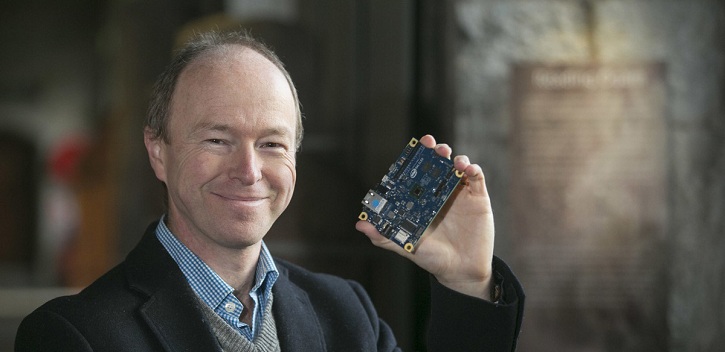UCC works with INTEL's latest technology

The research labs in UCC Computer Science are abuzz with the arrival of the latest in embedded computing from Intel.
INTEL previously selected UCC as a pre-release home for their Galileo platform and have on this occasion also provided 40 devices for use in teaching and student projects.
Galileo is a powerful embedded computer with broad applications, including healthcare, security, transportation and robotics. It was designed in Ireland, and initially released to just 17 universities across the globe – in addition to UCC the list includes the Sapienza University of Rome, Tsinghua University in Beijing, and Georgia Institute of Technology in Atlanta. UCC has a track record for research in embedded wireless networks and speaking on behalf of Computer Science, Professor Cormac Sreenan expressed his delight with the new arrivals, saying that "we have exciting plans for these boards, and our students will benefit from exposure to the very latest in embedded computing."
Unlike general-purpose computers such as desktop and tablet PCs, embedded computers are designed for specialised applications and often go unnoticed. However they have been around since the days of the Apollo moon missions, when they were used for on-board guidance and navigation. Today, embedded computers operate a wide range of appliances, from personal devices such as mobile phones and digital music players, to traffic lights and assembly-line robots. Recent technology advances are yielding lower-cost and lower-power devices, encouraging a vision in which embedded computers can communicate to form the so-called Internet of “Things”, where everyday devices can be controlled over the Internet. Galileo is based on the Intel Quark processor operating up to 400MHz, providing an interesting capability to run quite sophisticated software algorithms for data analysis, image processing, etc.
At UCC, Professor Sreenan’s students in the Mobile & Internet Systems Lab are exploring the use of Galileo for projects that include a home automation gateway and a smart camera. In a project with Dr Ken Brown of UCC’s INSIGHT Centre for Data Analytics and CTVR (the Telecommunications Research Centre), Galileo is being used to autonomously guide a robot to assist in healing wireless networks that have been damaged after a disaster. As the Internet is evolving to recognise the role for communication with and between devices, many new application areas are starting to emerge. Examples include environmental monitoring, home/factory automation, smart transport systems and energy management. The promise is a profound shift in the manner in which technology impacts our daily lives. UCC is firmly positioned at the forefront of this technology revolution, already solving many of the key research challenges.
Mobile and Internet Systems Laboratory
Contact us
Department of Computer Science, Western Gateway Building, University College Cork, Western Road, Cork, Ireland.
